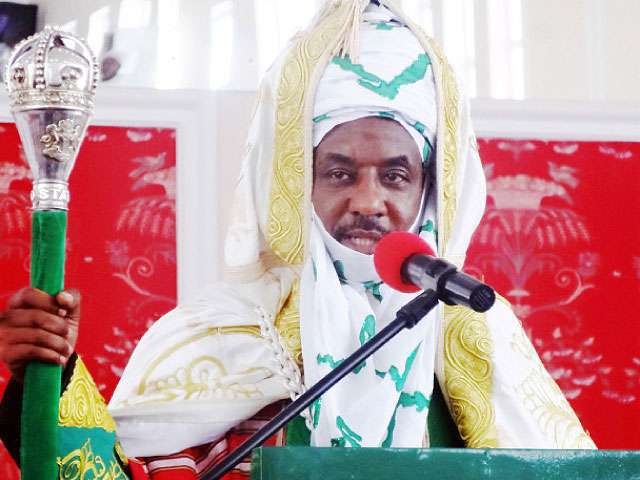Muhammadu Sanusi II, the Emir of Kano and a former Governor of Nigeria’s Central Bank, fielded questions bordering on the state of industrialization, integration, investments, and finance on the African continent at sideline of the 2018 Annual Meetings of the African Development Bank Group in Busan, Korea. Business a.m.’s ADESOLA AFOLABI who monitored the televised interview brings the excerpts:
Recently, Africa has revamped various efforts towards ensuring continental regional integration such as the CFTA. The ECOWAS is also meeting possibilities of a single currency while the African Union is planning to build high street railways to connect all the continent’s major cities. When you look at all of this, how can these impact industrialization going forward?
I think some of them are extremely good measures, but some of them need to be slowed down a bit. I think a trade document is important, while the railways and infrastructures are critical. Before you actually begin to move forward on a single currency, you need to improve traffic and trade.
The transaction costs that you save do not justify a single currency, and losing monetary independence if the trade is less than 10 percent is not worth the while. So we need to get trade to a level; these Asians countries that have 35 percent trade among themselves don’t even have a single currency though they do peg themselves to the euro in one way or another.
I think that before you move to a single currency in West Africa or in Africa, you need to build trade relations so that it makes sense, and you can save transaction cost behind the single currency we are moving to. The infrastructure, the trade agreements, the coordinated economic approach to the world is important. Look, Europe negotiates to China as a bloc, if Europe can trade as a bloc, why can’t we in Africa trade as a bloc.
What are the roles of our fiscal and monetary authorities in Africa towards creating efficient markets?
First of all, the finance ministers and the central banks should focus on providing a stable macroeconomic environment. The central bank is to provide macro stability along with finance. Some of the things the finance ministries can do are to look critically at increasing the tax base, improving allocative efficiency, and improving public financial management.
That is the work of a finance minister, and as finance ministers continue to improve that and people begin to see more transparency in their dealings, and how government revenue is being spent, then there would be progress. Equally, the different government agencies should have greater transparency in management and investment.
For example, if the finance ministry allocates money to an individual ministry, that ministry has the responsibility for making sure that it does what it’s supposed to do. So, the government as a whole needs to do this. When you look at countries like Rwanda, Cote D’Ivoire, Senegal, Kenya, etc., this is what they are now focusing on, and this is why their reputations are improving and investors keep coming. We need foreign investors, but there are enough local domestic savings to finance a significant part of industrialization if we have the system in place.
You talked about Africa coming together to trade as a bloc with China and the rest of the world during your presentation; can you please elaborate on that?
Well, you need to have a more level playing field when you are negotiating. Imagine China negotiating with the Benin Republic or with Cameroun, but when you have something like the China-Africa forum, African countries interest will actually have been unified. So before we go to such forums, wherever they have it, let us as Africans identify what we want from China, what are our demands? And right now what we want from China is to want China to see how these labor-intensive industries can come to Africa and not to Bangladesh, Pakistan or Malaysia. How do you negotiate that? What environment do you create for that? This will create at least 100 million jobs to the African continent. How do you work on the trade deficit in China? By getting China to buy more African goods. If China moves away from an investment-driven mode to a consumption-driven model, how do you produce those goods that China needs to consume so that we now produce these goods on the African continent and export to them and earn foreign exchange. That way you get the investments, you’ve improved your terms of trade and you stimulate economic growth. But you can only do that if you have a coordinated approach to China.
What do migration and shared prosperity mean for industrialization in Africa?
People migrate from Africa because they are moving away from the ghettos that have been created by an unequal world, and if Europe sees migration as a problem, it needs to focus on poverty as a problem as well.
What would it cost to invest in converting all the solar energy that we have in the Sahel, into electricity so that industries can be created and jobs can be created for these young men so that they don’t need to travel to Europe.
Why can’t we look positively at how we can bring back, some of that prosperity back to Africa, rather than continue to take away and profit from investment in Africa while blocking Africans from continuing to share in that prosperity. Why should Africans be part of this conversation where we are encouraging breaking down all the barriers to the movement of capital, to movement of profits, movement of dividends, while we are putting barriers around human beings. These are the kinds of questions that as Africans we need to start asking, to get out of this post-colonial, neo-colonial mindset and move into a world in which we are thinking as Africans and where African interest is our interest.








